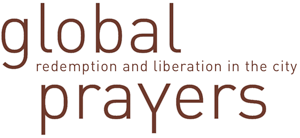The Role of Pentecostal Churches of African Origin in the Situation of African Migrants in Berlin
We are not refugees in any country or city; we are refugees in your Kingdom, Lord.
[Prayer of a Pentecostal Pastor in Berlin]
The project global prayers conducts research on Pentecostal churches and believers in Lagos and Rio de Janeiro - cities where the Pentecostal movement is currently especially vibrant. But Pentecostalism does not only influence cities in the Global South. Migration and an universal claim of mission carries the young religious movement over the boarders of the continents and takes it to Europe. Especially in neighbourhoods of European metropolises, where many migrants live, big Pentecostal organisations like the Nigerian Redeemed Christian Church of God and the Brasilian Igreja Universal do Reino de Deus build up daughter parishes whereas other congregations are founded anew by pastors from Africa and Latin America.
Against the background of this development my research investigates Pentecostal churches of African origin in Berlin. Unnoticed by the public many Pentecostal churches of African origin have emerged in Berlin during the last years. Whereas mosques have recently gained more visibility in the city as the examples of the Mashari Center in Kreuzberg and the Sehitlik Mosque in Neukölln illustrate, Pentecostal churches of African origin mostly remain invisible in the urban space of Berlin. Nevertheless they have established spaces for their spirituality in different spots of the city.
On the basis of an ethnography in two Pentecostal churches in the borough of Wedding my study asks, what meaning those churches have for African migrants in Berlin. I consider three questions of main importance: What kind of resources do the churches provide for their members? Which role does religion and the belonging to a religious community play for people living in a „foreign city“? And finally, which spaces do the congregations capture for their churches, what are the characteristics of these spaces and what meaning do they have for the believers?
I argue that both of the Pentecostal churches provide different resources for their visitors. On the one hand, the churches function as social networks, where in an informal way information about living and job opportunities circulate. On the other hand, one of the churches established an office for counselling and advice which can be considered as a form of institutionalized help which is also open to people from outside the church. Spirituality is the most important resource. Members of transnationally spread churches find a ‘spiritual home’ in Berlin’s parish and the spirituality is a source of hope for migrants who find themselves in precarious living conditions in Germany. The religious practices which are typical for Pentecostal Churches of African origin such as dancing and singing in worship and praise mean a relief to the believers. Praying I interpret as a mode of behaviour which enables the believers to take action in a powerless situation.
I develop the argument that the improvised churches function as secure holy spaces for their visitors. The religious practices transform a former secular place into a sacred space where security for its visitors is characterised as the opportunity to live their spirituality as well as the belonging to a community and the connection to pastors who take the role of persons of trust.
The secure holy spaces for African Pentecostal believers in the city of Berlin can only be created as and if the congregations of African origin accept the urban conditions and are flexible enough to move from one place to another and capture different places for their spirituality.
The project was funded by the Heinrich-Boell-Stiftung.
